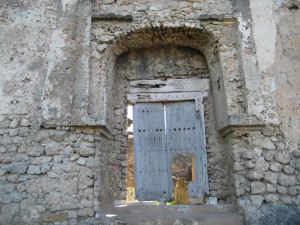Written by Marco Ramerini. Photos by Alan Sutton
Situated along the coast of Tanzania, Kilwa fort was built by the Portuguese in 1505 and was the first stone fort built by the Portuguese along the coast of East Africa. The construction of the fort was the work of the sailors and soldiers of the squadron of D. Francisco de Almeida, the first viceroy of Portuguese India. The fort was built soon after the conquest of the city of Kilwa (Quiloa), which took place on July 25, 1505. A few years later, in 1512, the Portuguese abandoned the fortress.
Today the remains of the fortress are made up of a small square fortification of about 20 meters on each side, the side facing the land is the best preserved, while the side towards the sea was largely destroyed in recent years. The fort still maintains two towers at its corners to the land side, while on the sea side, there are only a few remains of a tower and a bastion.

The fort of Kilwa Kisiwani is on the UNESCO World Heritage list since 1981.
Inscription criteria: Ruins of Kilwa Kisiwani and Ruins of Songo Mnara. The remains of two great East African ports admired by early European explorers are situated on two small islands near the coast. From the 13th to the 16th century, the merchants of Kilwa dealt in gold, silver, pearls, perfumes, Arabian crockery, Persian earthenware and Chinese porcelain; much of the trade in the Indian Ocean thus passed through their hands.
In 2004 it was inscribed on the List of World Heritage in Danger.
[divider]
[divider]
BIBLIOGRAPHY:
– Various Authors “People of Zanzibar: The Portuguese period. The Portuguese legacy” Internet article.
– Various Authors “Documentos sobre os portugueses em Moçambique e na Africa central, 1497-1840. Documents on the Portuguese in Mozambique and Central Africa, 1497-1840” National Archives of Rhodesia and Nyasaland, Centro de Estudos Históricos Ultramarinos, 1962-(1989), Lisboa. Includes indexes. “The sources have been drawn from archives and libraries in Portugal, Italy, France and other countries … Published in the original with an English translation. Contents: v. 1. 1497-1506.–v. 2. 1507-1510.–v. 3. 1511-1514.–v. 4. 1515-1516.–v. 5. 1517-1518.–v. 6. 1519-1537.–v. 7. 1540-1560.–v. 8. 1561-1588.–v. 9. 1589-1615.
– Axelson, Eric “South-East Africa, 1488-1530” 306 pp. 1940, JLondon, UK. – Axelson, Eric “Portuguese in South-East Africa, 1488-1600” 276 pp. Struik, 1973, Cape Town, S.A.
– Axelson, Eric “Portuguese in South-East Africa, 1600-1700” x + 226 pp. Witwatersrand University Press, 1969, Johannesburg, S.A.
– Boxer, Ch. R. “Moçambique island and the Carreira da India” In STUDIA N° 8, pp. 95 – 132, 1961, Lisbon, Portugal.
– Freeman-Grenville, G. S. P. “The Portuguese on the Swahili Coast: buildings and language” In STUDIA N° 49, pp. 235-253, 1989, Lisbon, Portugal.
– Freeman-Grenville, G. S. P. “The French At Kilwa Island: an episode in eighteenth- century East African History” Clarendon press, 1965, 243 pages plus illustrations.
– Gray, J. “Early Portuguese Missionaries in East Africa” 53 pp. illus, map Macmilland and Co., 1958. – Gray, Sir John “Visit of French Ship to Kilwa in 1527” Paper. Off Print edition.
– Pearson,M.N. “Port cities and intruders: the Swahili Coast, India and Portugal in the Early Modern Era”202 pp. 2 maps, The Johns Hopkins University Press, 1998, Baltimore and London. Index: The Swahili coast and the Afrasian sea; the Swahili coast and the interior; East Africa in the world-economy; the Portuguese on the coast.
– Penrad, J. C. “O encontros dos mundos. Islamismo, redesde confrarias e competiçao na Africa Oriental” In: “Oceanos” n° 34; Apr/Jun. 1998; pp. 132-140
– Rajab al Zinjibari, Khatib M. “Islam and the Catholic crusade movement in Zanzibar” Index: Pre-Islamic era in Zanzibar; from Ethiopia to Zanzibar; Zanzibar in Muslim historiography; the origins of crusade in Zanzibar; the Portuguese motive in Zanzibar; Zanzibar Jihad for protection; Portuguese legacy in Zanzibar; Muslim liberation and Islamic revivalism.
– Strandes, J. “The Portuguese period in East Africa” xii, 325 pp., 5 plates, folding map, Edited by J. S. Kirkman, 1968, Nairobi, Kenya.